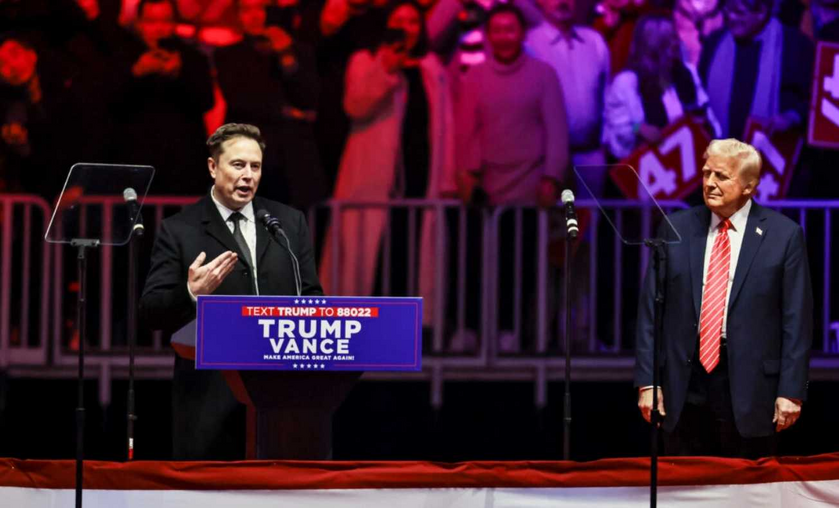
A coalition of 14 Democratic state attorneys general is attempting to block the Department of Government Efficiency (DOGE) from accessing federal payment systems, claiming that the advisory committee—led by tech billionaire Elon Musk—has no legal authority to review government financial records. The lawsuit, spearheaded by New Jersey Attorney General Matthew Platkin, alleges that DOGE’s access violates privacy rights and separation of powers principles.
However, a strict constitutional and legal analysis suggests that President Donald Trump’s administration is well within its authority, and DOGE will likely prevail in court. The President’s Article II powers, the Treasury Department’s discretion, and existing legal precedents strongly favor the administration’s actions.
Trump’s Constitutional Authority Over Executive Agencies
At the heart of the controversy is whether President Trump, as the head of the executive branch, can direct federal agencies to review government spending and access payment data. The answer is an unequivocal yes.
Article II and the President’s Executive Power
The U.S. Constitution vests all “executive power” in the President under Article II, Section 1. This means Trump has the authority to direct, supervise, and reform executive agencies as he sees fit, within the bounds of federal law.
Furthermore, Article II, Section 3 states that the President must “take Care that the Laws be faithfully executed.” This obligates him to ensure efficiency and prevent waste in government programs, which is precisely what DOGE was created to accomplish.
Historically, presidents have exercised broad discretion over executive agencies, appointing special commissions and task forces to audit spending and increase efficiency. Trump’s decision to grant DOGE access to the Treasury Department’s payment systems follows this well-established tradition.
DOGE’s Access to Federal Payment Systems Is Lawful
Despite the lawsuit’s claims, the executive branch routinely grants internal access to payment systems for oversight and efficiency reviews.
Treasury’s Authority to Share Financial Data
Treasury Secretary Scott Bessent, appointed by President Trump, has full statutory and regulatory authority over how federal payments are processed. It is commonplace for government oversight bodies—such as the Government Accountability Office (GAO) and the Office of Management and Budget (OMB)—to access financial records for audits and fraud prevention.
Unless Congress explicitly prohibits DOGE’s access through clear statutory language, the default rule is that the executive branch retains discretion over its own financial review processes. The state attorneys general have failed to cite any specific law that prevents DOGE from accessing payment systems.
No Evidence of Privacy Violations
The lawsuit also argues that DOGE’s access would violate Americans’ right to privacy. However, there is no evidence that individual financial records are being accessed. Rather, DOGE appears to be conducting aggregate reviews of federal expenditures—a function that has long been carried out by various executive oversight bodies without legal issue.
Does DOGE Have the Authority to Block Payments?
A key argument from the lawsuit is that President Trump and DOGE are seeking to block or delay federal payments approved by Congress.
While the Impoundment Control Act of 1974 limits the President’s ability to withhold Congressionally approved funds, it does not prohibit the executive branch from reviewing payments before they are made—especially to prevent fraud, inefficiency, or improper expenditures. DOGE’s review appears to fall well within this legally permissible oversight role.
Legal Precedents Favor Trump and DOGE
Several Supreme Court precedents suggest that the courts will likely uphold the President’s authority in this case:
- Myers v. United States (1926) – The Court affirmed the President’s broad powers over executive officials and agencies.
- Chevron U.S.A. v. NRDC (1984) – Established that executive agencies receive deference in decision-making unless Congress explicitly restricts them.
- Trump v. Hawaii (2018) – Held that courts should defer to the President when exercising his constitutional executive powers unless there is a clear legal violation.
Unless plaintiffs can show a specific statutory violation, courts are unlikely to intervene in what is clearly an executive oversight function.
Conclusion: A Political Lawsuit, Not a Legal One
The Democratic-led lawsuit against DOGE is a political move rather than a sound legal challenge. The President has broad constitutional authority to oversee executive agencies, and the Treasury Department has clear discretion in allowing internal reviews of government spending.
With no clear legal prohibition on DOGE’s access to payment systems, and with existing Supreme Court precedents favoring presidential discretion, it is highly likely that Trump’s administration will prevail in court.
Rather than a legitimate legal challenge, this lawsuit appears to be yet another attempt to obstruct the Trump administration’s efforts to reform and streamline the federal government. The courts should reject this politically motivated interference and uphold the President’s lawful authority.
Sources:
Constitutional Provisions:
- U.S. Constitution, Article II, Section 1 – Vests all executive power in the President.
- U.S. Constitution, Article II, Section 3 – Requires the President to “take Care that the Laws be faithfully executed.”
Relevant Statutes & Laws:
- Impoundment Control Act of 1974 (2 U.S.C. §§ 681-688) – Limits the President’s ability to withhold Congressionally approved funds but does not prohibit executive oversight of payments.
- Budget and Accounting Act of 1921 (31 U.S.C. §§ 1101-1125) – Establishes the President’s authority over federal budgeting and financial oversight through the Office of Management and Budget (OMB).
- Federal Property and Administrative Services Act of 1949 (40 U.S.C. § 101 et seq.) – Grants the executive branch authority over federal agencies’ internal management and efficiency efforts.
Supreme Court Cases:
- Myers v. United States, 272 U.S. 52 (1926) – Established that the President has broad power to control executive officers and agencies.
- Chevron U.S.A. Inc. v. Natural Resources Defense Council, Inc., 467 U.S. 837 (1984) – Courts defer to executive agencies unless Congress explicitly restricts them.
- Trump v. Hawaii, 138 S. Ct. 2392 (2018) – Affirmed that courts should defer to the President’s executive authority in policy decisions unless a clear statutory violation is present.
- Seila Law LLC v. Consumer Financial Protection Bureau, 591 U.S. ___ (2020) – Reinforced the President’s broad authority over executive agencies and their oversight.
- Mississippi v. Johnson, 71 U.S. 475 (1867) – Held that courts cannot interfere with the President’s executive functions unless Congress clearly forbids an action.
Executive & Agency Authorities:
- Treasury Department Oversight Rules (31 U.S.C. §§ 321, 3512) – Grants the Treasury Secretary discretion over financial management and reporting within the executive branch.
- Government Accountability Office (GAO) Audit Authority (31 U.S.C. § 712) – Demonstrates executive branch review of federal expenditures is routine and lawful.












